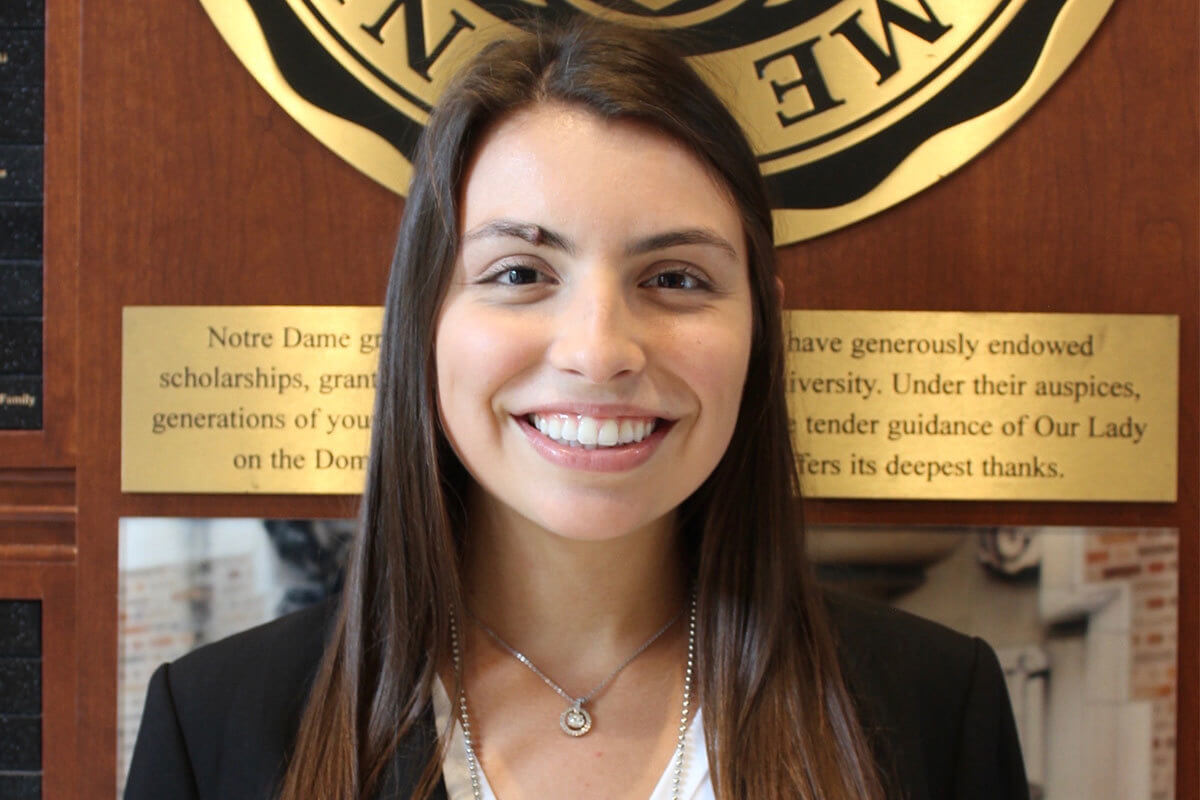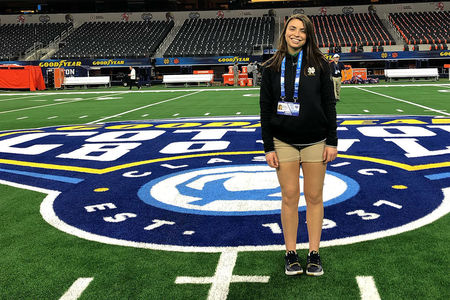
When Brianna Drummond walked into her first Russian class at Notre Dame, she didn’t know much about the language — including that it had its own alphabet.
Now, nearly four years later, Drummond is reading poetry and prose in Russian, discussing how they connect to important historical events, and preparing for a full-time IT job at Ford Motor Co. that could draw on her knowledge of Russian.
“The other day, I left class so fascinated by what we had learned and excited about how we can talk about it all in Russian,” she said. “It’s awesome when you can leave class feeling so rejuvenated because you were learning something you really enjoy.”
Drummond, who is majoring in political science as well as Russian, originally stumbled upon the language through her interest in the field of national security. Thinking it would be useful in a future career, Drummond chose Russian to fulfill her language requirement during her first year.
While she picked the language on a whim, she quickly became fascinated with Russian culture in her first classes taught by Melissa Miller, an assistant teaching professor and director of undergraduate studies.
“Professor Miller does a really good job in her language courses of talking about how the language is related to the culture, so you’re learning a lot about not only vocab as you’re in beginner classes, but also how that interacts with the culture in the country,” Drummond said.
As she progressed into intermediate classes, the coursework became more challenging, but this only further inspired Drummond, as she and her fellow classmates began studying together and helping each other.
Small class sizes also allowed Drummond to make connections with her professors, who were always willing to offer extra help outside of class hours.
“I was motivated by the challenge, combined with the fact that I had a team with me, and the professors were always checking in because it’s a small department, so everyone knows you,” she said. “I have so many friends now from the Russian major — it’s a great way to have a little community within the larger Notre Dame community.”
“I was motivated by the challenge, combined with the fact that I had a team with me, and the professors were always checking in because it’s a small department, so everyone knows you. I have so many friends now from the Russian major — it’s a great way to have a little community within the larger Notre Dame community.”
Solving a puzzle
What started off as a language requirement grew into a passion for Drummond, who declared a Russian major by her junior year.
“I know that it’s really valuable because it’s something that I’ll know forever, and I’m glad I challenged myself to learn something new in college,” she said.

Another new area of study Drummond has explored in Arts & Letters is the Idzik Computing and Digital Technologies program (CDT). Interested in technology’s growing prevalence within national security, Drummond pursued the minor to gain the skills needed to work in cybersecurity.
“CDT showed me a completely new way of solving a problem or thinking about a problem.” she said. “It was fun and exciting, and the coursework was different from my political science and Russian work. I really like how the three disciplines complemented each other and shaped my experience outside of the classroom.”
Through the CDT minor, Drummond discovered the student investigator internship program through the St. Joseph County Cyber Crimes Unit, which she joined the summer before her junior year. Student investigators are tasked with analyzing devices submitted by various police agencies and preparing reports on any evidence found.
“I had never thought about the importance of technology in investigating crimes, so that was initially interesting,” Drummond said. “Solving things with technology is like a puzzle, and I was very excited when I could find the pieces of the puzzle they were looking for.”
Learning to think critically
With her knowledge of digital forensics from her CDT classes and internship experience, Drummond secured an information technologies internship with the digital forensics team at Ford last summer.
Drummond made an exciting discovery on the job — Ford needed employees who could understand Russian. She met with a supervisor who expressed interest in having Drummond on her team because of the possibility of her ability to understand Russian code.
“I had no clue that I would be using Russian at all, so that was amazing — being a political science major coming into a tech space can be a little intimidating, but I knew I had some expertise in a specific area from CDT,” she said. “Also, through Arts and Letters you learn to think critically about things, so I never felt like I was behind.”
Drummond accepted a full-time offer from Ford and will be joining the three-year Ford College Graduate Program in the IT sector after graduation.
While she began college set on a future in national security, Drummond found the flexibility within Arts & Letters to explore a new language, new skills, and a variety of career paths.
“It's definitely an open-ended education,” she said. “You’re so encouraged to learn and surrounded by other viewpoints and people that are studying completely different things. I just think that’s awesome.”
“I had no clue that I would be using Russian at all, so that was amazing — being a political science major coming into a tech space can be a little intimidating, but I knew I had some expertise in a specific area from CDT. Also, through Arts and Letters you learn to think critically about things, so I never felt like I was behind.”
Originally published by at al.nd.edu on May 10, 2021.